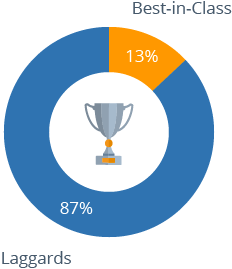
How would you assess the skills/competence in the field of (big data) security analytics in your organization compared to your main competitors? (n=293)
When asked to assess their competence in the field of big data security analytics compared to their main market competitors, a vast majority of respondents identified themselves as laggards, falling behind or matching the average skills level in their industry at best. Only 13% of participants rated their skills as being much better than their competitors
Of course, this could be attributed to the general skills gap plaguing the IT industry nowadays. Also, most smaller companies simply cannot afford to have a dedicated team of experts to manage their security infrastructures. However, since the new-generation security solutions based on big data analytics were actually designed in answer to this skills shortage, this probably indicates that many companies still continue to think of information security as a set of tools and perceive the RTSI solutions as just another tool to be added to their IT infrastructure.
This, of course, could not be further from the truth – these solutions are designed to be more intelligent and highly automated and to speak the language of business, with user experiences, reports and other functional areas specifically designed for non-experts. It seems that vendors in this market should pay more attention to getting this message across to potential customers.
Big Data and Information Security Report
How big data technology can help to increase cyber attack resilience by better detection of attacks, enabling real-time response.
Request the free report now





